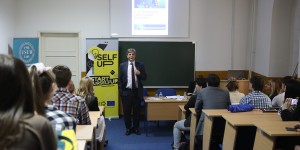This interview was originally published in the daily Faktor on 9 May 2016.
On 9 May 1950, the idea of forming a community which is considered a forerunner of today’s European Union (EU) was born. It is precisely because of this fact that 9 May is celebrated as Europe Day, and it is also celebrated in our country. We spoke about BiH’s path towards the European Union with Ambassador Lars-Gunnar Wigemark, Head of the EU Delegation to BiH and EU Special Representative in BiH.
Interviewed by: Nedim Pobrić
FAKTOR: Last year was regarded as the year of return of BiH to the European path. Judging by the first four months of this year, would you say we were able to keep this course?
WIGEMARK: I think so. Now is really the moment of truth, in the coming months, when a number of commitments made last year need to be delivered. It is good that the Reform Agenda was agreed upon last year and now it has to be implemented. There are basically three stages, and we are nearing completion of the first one. I hope that in the next month or so an agreement can be reached with the International Monetary Fund (IMF) and the World Bank. This is very important also for the EU. New labour laws in both the Federation of BiH and Republika Srpska must be implemented.
When it comes to adaptation of the Stabilisation and Association Agreement, negotiations are going well and both sides understand what needs to be done. This is a very favourable deal for BiH, you can gain something beneficial to the whole country and I must emphasise this because of the information circulating that this is a negative agreement. It is absolutely essential, not just for your trade and agriculture, but for the whole country and must be looked at in this context.
When it comes to the coordination mechanism, I would like to encourage all the parties involved, starting with the Council of Ministers, and in particular entity levels, cantons and Brčko District to reach a final agreement. They are very close to reaching an agreement, but they should not link other issues with the coordination mechanism.
FAKTOR: Are you satisfied with the present implementation of the Reform Agenda?
WIGEMARK: I am very pleased with what has been done both at the state and entity levels. It is also very encouraging to see that in some cantons, such as Tuzla Canton that I recently visited, steps are being taken to implement the Agenda at that level too. I believe we are approaching the end of the first stage, in which the labour laws were among the most important pieces of the new legislation, but also the agreements with the IMF, the World Bank, and the European Bank for Reconstruction and Development (EBRD).
These are essential because of the financing of the whole reform package. This reform package does not involve any new taxes, in terms of increasing tax burdens, it’s fiscally neutral. If you reduce the tax on labour, you have to compensate with something, and the issue of excise taxes on fuel, alcohol, tobacco, etc. comes into play. I think that this must be explained clearly to people, in order for them to understand what it is about. It’s not whether you’re paying five percent more for a bottle of beer, wine or other drinks, it’s about lowering the cost of labour so that more people can get to work. In terms of the next stage, by the end of June is the deadline for reaching an agreement with the IMF and the new extended fund facility with the IMF. IMF representatives will arrive in the country this week in what should be the final mission to sort out all the details, which include the regulation of the banking sector and greater transparency in the banking sector. The World Bank is very concerned with the system of pricing of pharmaceuticals. People in BiH pay 30 or 40 percent more for medicines than people in neighbouring countries. That is why people go to Belgrade or Zagreb to buy basic medicines, which is not correct.
FAKTOR: You mentioned the issue of the banking sector, and in an earlier media appearance you mentioned that Banka Srpske is not the only contentious issue in this segment. What are the banks in question and what is the problem with the banking sector in BiH?
WIGEMARK: I did not even mention Banka Srpske. It is only a symptom of a much wider ill, or the tip of the iceberg. You have to look at the entire banking sector in both entities. There must be more transparency, there should be more independent audits and it is not fair if some banks are too subsidised and it does not make sense. If you have a bank that generates losses or a company that does so, you should consider if you will continue subsidising them or not. This can also be said for some public enterprises. You have some fairly big companies that are loss making or do not generate any profit because all the profit goes to filling the gaps that exist, instead of making hard but necessary decisions to improve efficiency. This does not mean that banks and companies have to be shut down, but they need to be made more efficient. It is about generating growth, and improving the economy by creating new jobs. There are some very healthy banks, very healthy companies, but everybody suffers if there is a sick part of the economy. This must be addressed. We are not here to make things harder for you, on the contrary. We want a better climate for all, a healthier economic climate.
FAKTOR: One of the obligations of BiH on its European path is the publication of the census results, and the deadline is 1 July. What if we don’t make the deadline?
WIGEMARK: Right now the legal deadline is 1 July. I think that even if a decision on the methodology was made today, and currently there are still certain disagreements over who should be considered resident, which concerns a very limited number of people, you would still need three to four months to harmonise and finalise the figures to publish the results in orderly way. In some ways, you are already past the deadline. If there is any extension of any deadline, it is essential that this is not too long. This has to be done. It is in interest of people here to know the data on the number of people and the EU will ask BiH, if your application for membership is approved and you go to the stage of evaluation and analysis, how many people live here, where do they live, how old are they, what do they do and things like that. As I said, we are not so concerned with the results of the optional questions. The question of whether you are Serb, Croat, Bosniak, Roma or other was optional. This will not change the economic and social conditions in the country. That does not mean that this is not important to know, but as far as the EU is concerned, it does not really matter.
FAKTOR: The ethnic structure of the population here is really the key issue. In what way can it affect the internal organisation of the country?
WIGEMARK: I think that nothing will change in your Constitution, which will remain as it is now. The Constitutional arrangements that were part of the Dayton Agreement in 1995 were based on the 1991 census. The new results would not change anything. In order to change the Constitution, there needs to be a parliamentary majority, everybody should be in agreement. As far as I know, there is no consensus on amending the Constitution.
FAKTOR: Recently, a meeting was held in Brussels on the subject of adaptation of the trade part of the Stabilisation and Association Agreement (SAA). When can we expect the Agreement to be initialled?
WIGEMARK: The SAA can be initialled when both sides believe that they have reached the best possible solution, which is mutually acceptable and following proper consultations with the major parties. By that I don’t mean only the political parties. Within the European Commission it needs to be clarified whether this is an acceptable agreement. The agreement has not yet been finalised and is not ready to be initialled. There are details that have not been settled. As I said, it is important that people understand the real facts. The media is making the numbers up or releasing figures without checking the facts. To say that this will undermine your entire agriculture is simply not true. We are talking about two or three products. The main concern on your side, as far as I understand, relates to milk and dairy products. The EU has already done a lot there. BiH has made a real breakthrough last year by meeting the standards and obtaining the export license. We are not talking only about Croatia, but about the market of 500 million consumers. You already have very favourable preferential trade regime. It is not about a free trade agreement. It is limited to a small number of products. I believe that your agriculture can benefit from this, in a very important way. We as the EU are ready to support your agriculture more, but for that to happen this agreement must be reached. The SAA cannot function without it. Without adaptation there is no application.
FAKTOR: It’s been two months since the submission of the application for EU membership. What are the biggest obstacles for the European Council to accept the application?
WIGEMARK: When it comes to the Reform Agenda, it is important to reach an agreement with the IMF and the World Bank, and to continue the implementation in order to say that the first stage of the three-year programme has been completed. An agreement on the adaptation of the trade part of the SAA must be reached in the coming month or two, in order for the Council and the Member States to approve your application. It is the same with the coordination mechanism. It must be finalised as soon as possible. Without it you are not in position to agree even on the Agenda, to send a representative, a group of people to represent BiH including the entities and cantons, whose views and opinions could be presented. This is why the coordination mechanism is important. Some EU and BiH meetings have been postponed, since March and April. I would strongly encourage all political leaders not to play politics with any of these issues, especially concerning the adaptation and coordination. I find unfair criticising the adaptation of the SAA, without knowing all the details, incomprehensible. I know that elections are in October, but I do not think this should not be an issue. The same goes for the coordination mechanism. I understand that the Constitution, jurisdiction and different roles of the state, entities and cantons must be respected. We are not interested in changing your Constitution. We’re not here to rewrite Dayton, but the state must function, and it can work if there is political will.
FAKTOR: Judging by your formal and informal meetings with local politicians, do you recognise a united commitment of Bosnia and Herzegovina to the European path?
WIGEMARK: Everyone seems committed, everyone claim they are committed, and that they do not want to obstruct. In practice, many people are. They are looking at it from a very narrow perspective and are linking various issues. Politics is all about compromise. You cannot take maximalist approach and get everything you want. I think that good leadership is the ability to recognise what is in the interests of the nation, the country and the people. Most of the people here, regardless of ethnicity and place of residence, want to move forward as soon as possible and everything is in your hands.
Photo: Faktor.ba/M. Živojević




